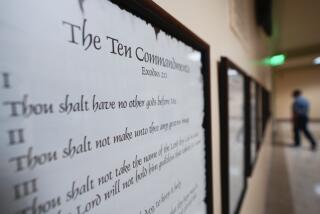KKK loses lawsuit on handing pamphlets to drivers in Missouri town
In trying to take its message to the streets, the Ku Klux Klan has been ordered to keep white supremacy on the sidewalk.
A three-judge panel of the U.S. 8th Circuit Court of Appeals has rejected a Klan chapter’s lawsuit against a Missouri town, which enacted a law barring Klan members and others from going into the street to hand leaflets to drivers.
The decision is the latest chapter in a two-year municipal battle that was touched off when Klan members attempted to distribute racially charged pamphlets in a suburb not far from the restive protests in St. Louis over the fatal police shooting of an unarmed black man.
The Traditionalist American Knights of the Ku Klux Klan based in Park Hills, Mo. — described by its leader as a faction that tries to maintain the original traditions and ceremonies of the KKK — sometimes wear their hoods and regalia to hand out leaflets in towns in Missouri.
According to documents in a federal lawsuit, the Klan’s leaflets include warnings about the dangers of methamphetamine to the “white race” and “violent black and white crime,” and call for neighborhood watches, obtaining firearms and defending “white Christian culture [and] the future of our nation” against Islamic law.
The city of Desloge, about 60 miles south of St. Louis, is one of the towns where the Traditionalist American Knights chapter had hoped to hand out pamphlets. Desloge’s 4,950 residents are 97% white, and the Klan believes its city leaders have targeted the Klan for a crackdown.
“The neighboring town, Park Hills, we go there just as often, and the police don’t bother us at all,” Frank Ancona, the imperial wizard of the Traditionalist American Knights of the Ku Klux Klan, told the Los Angeles Times on Monday. He named other Missouri towns that haven’t given the Klan trouble for handing out pamphlets: Farmington, Union, Fredericktown.
But when Ancona’s group planned to visit Desloge in 2012, city officials told them an ordinance prevented anyone from passing out pamphlets on either the roads or the sidewalks.
Distributing pamphlets, even with offensive messages, is protected by the 1st Amendment, and when the Klan took its case to a federal judge, the American Civil Liberties Union assisted with the case, as it sometimes does with cases involving the 1st Amendment.
The federal judge slapped the city with an injunction on Dec. 27, 2012, after the law was declared an unconstitutional infringement on free speech. The ACLU hailed that victory in a statement, saying, “Scouts, Little League baseball teams, firefighters, politicians and others will be able to solicit and pass out handbills in the city of Desloge without fear of arrest.”
But the battle wasn’t over. The city would amend the law two more times and the Klan would take officials to court again.
When the Klan visited Desloge to give pamphlets to drivers in early April 2013, a Desloge police officer warned Klan members that a new, slightly narrower city ordinance — passed two weeks earlier — prohibited anyone from stepping off the curb and into a roadway to hand pamphlets to drivers.
Punishment included a fine up to $500 and up to 90 days in prison.
The Klan members decamped and filed another federal lawsuit on April 29, 2013. Ancona, the imperial wizard, said not long after he saw a group of children standing in the middle of the street to collect money from drivers for a school trip. No police bothered them, Ancona said, adding that he thinks the Desloge law “was made to discriminate against the Traditionalist American Knights.”
City and police officials denied that claim, and denied that the law was unequally enforced.
“I absolutely think it’s false,” Desloge Police Chief James Bullock said Monday.
The original ordinance had been passed for safety reasons, both Bullock and City Administrator Greg Camp said. In August 2013, city officials amended the law again, adding language that explicitly cited public safety as the purpose for the law.
But another federal judge, Nannette A. Baker, agreed on Oct. 1, 2013, that the new law did not appear to be narrowly tailored enough to protect free speech, and issued a preliminary injunction in favor of the Klan.
City officials appealed. A 2-1 majority of the 8th Circuit panel overturned that injunction last week, with two of the judges siding with the city’s safety argument.
“The record here does not indicate that the city’s real motive for curtailing speech activities was to discriminate against particular messages,” Circuit Judge Diana E. Murphy wrote for the majority, and city officials were glad to see the law upheld.
Ancona told The Times his group was considering whether to appeal.
Twitter: @mattdpearce
More to Read
Sign up for Essential California
The most important California stories and recommendations in your inbox every morning.
You may occasionally receive promotional content from the Los Angeles Times.










